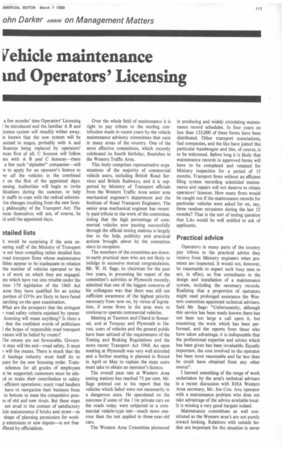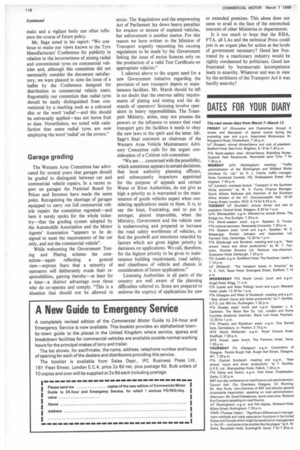Vehicle maintenance ind Operators' Licensing
Page 119

Page 120

If you've noticed an error in this article please click here to report it so we can fix it.
a few months' time Operators' Licensing L be introduced and the familiar A B and icence system will steadily wither away. is known that the new system will be anized in stages, probably with A and licences being replaced by operators' noes first of all. C licences will follow_ ms with A B and C licences—there
a few such "alphabet" companies—will re to apply for an operator's licence to ,er all the vehicles in the combined I on the first of the appointed days. ensing Authorities will begin to invite )fications during the summer, to help ir staffs to cope with the radical adminis:ive changes resulting from the new licen; philosophy of the Transport Act. The noes themselves will not, of course, be id until the appointed days.
rtailed lists
ft would be surprising if the area eneering staff of the Ministry of Transport re not been compiling rather detailed lists road transport firms whose maintenance ilities appear to be inadequate in relation the number of vehicles operated or the e of work on which they are engaged. ms which have run into trouble under the tion 178 legislation of the 1960 Act ause they have qualified for an undue portion of GV9s are likely to have faced arching on-the-spot examination.
Arhat are the prospects that the stringent road safety criteria enjoined by operat licensing will mean anything? Is there a . that the confident words of politicians I the hopes of responsible road transport rators will be belied by events?
fhe omens are not favourable. Governit may will the end—road safety. It must will the means. There is much that the d haulage industry must itself do to pare for the new licensing order. Train schemes for all grades of employees st be supported; customers must be eduxl to make their contribution to safety I efficient operations; many road hauliers have to reorganize their business from to bottom to meet the competitive pres s of old and new rivals. But these steps not avail in the context of satisfactory icle maintenance if bricks and straw—in shape of planning permission for workp extensions or new depots—is not freeffered by officialdom. Over the whole field of maintenance it is right to pay tribute to the sterling contribution made in recent years by the vehicle maintenance advisory committees that exist in many areas of the country. One of the most effective committees, which recently celebrated its fourth birthday, flourishes in the Western Traffic Area.
This body comprises representative organizations of the majority of commercial vehicle users, including British Road Services' and British Railways, and it is supported by Ministry of Transport officials from the Western Traffic Area senior area mechanical engineer's department and the Institute of Road Transport Engineers. The senior area mechanical engineer has recently paid tribute to the work of the committee, noting that the high percentage of commercial vehicles now passing successfully through the official testing stations is largely due to the help, publicity and practical actions brought about by the committee since its inception.
The members of the committee are downto-earth practical men who are not likely to indulge in excessive mutual congratulation. Mr. W. H. Sage, its chairman for the past two years, in presenting his report of the committee's activities at Plymouth recently, admitted that one of the biggest concerns of his colleagues was that there was still not sufficient awareness of the highest priority necessary from now on, by virtue of legislation, if some firms in the area were to continue to operate commercial vehicles.
Meeting at Taunton and Chard in Somerset, and at Torquay and Plymouth in Devon, users of vehicles and the general public have been advised of the requirements of the Testing and Braking Regulations and the more recent Transport Act 1968. An open meeting at Plymouth was very well attended and a further meeting is planned in Bristol in April or May to explain the steps users must take to obtain an operator's licence.
The overall pass rate at Western Area testing stations has reached 75 per cent. Mr. Sage pointed out in his report that the vehicles which failed were not necessarily in a dangerous state. He speculated on the outcome if some of the Ilm private cars on the roads today were subjected to a commercial vehicle-type test—much more onerous than the test applied to three-year-old cars.
The Western Area Committee pioneered in producing and widely circulating maintenance record schedules. In four years no less than 123,000 of these forms have been distributed. Other transport associations, fuel companies, and the like have joined this particular bandwagon and this, of course, is to be welcomed. Before long it is likely that maintenance records in approved forms will have to be completed and retained for Ministry inspection for a period of 15 months. Transport firms without an efficient filing system recording scheduled maintenance and repairs will not deserve to obtain operators' licences. How many firms would be caught out if the maintenance records for particular vehicles were asked for on, say, three random occasions during the last 12 months? That is the sort of testing question that LAs would be well entitled to ask of applicants.
Practical advice
Operators in many parts of the country pay tribute to the practical advice they receive from Ministry engineers when premises are inspected. It would not, however, be reasonable to expect such busy men to act, in effect, as free consultants in the design and installation of a maintenance system, including the necessary records. Realizing that a proportion of operators might need prolonged assistance the Western committee appointed technical advisers. Said Mr. Sage: "Unfortunately, although this service has been made known there has not been too large a call upon it, but examining the work which has been performed, and the reports from those who have taken advantage, it is indisputable that the professional expertise and advice which has been given has been invaluable. Equally important, the cost involved to the operator has been most reasonable and far less than he could have obtained from any other source".
I learned something of the range of work undertaken by the area's technical advisers in a recent discussion with RHA Western Area secretary, Mr. Joe Cox. Any operator with a maintenance problem who does not take advantage of the advice available locally is missing a very good bargain indeed.
Maintenance committees as well constituted as the Western area's are not purely inward looking. Relations with outside bodies are important for the situation is never
static and a vigilant body can often influence the course of future policy.
Mr. Sage noted in his report: "We continue to make our views known to the Tyre Manufacturers' Conference for publicity in relation to the incorrectness of mixing radial and conventional tyres on commercial vehicles and, although this committee did not necessarily consider the document satisfactory, we were pleased to note the issue of a leaflet by the Conference designed for distribution to commercial vehicle users. Regrettably our contention that radial tyres should be easily distinguished from conventional by a marking such as a coloured disc or the word 'radial'—and this should be universally applied—has not borne fruit to date. Nevertheless, we noted with satisfaction that some radial tyres are now employing the word 'radial' on the covers."
Garage grading
The Western Area Committee has advocated for several years that garages should be graded to distinguish between car and commercial vehicle repairs. In a recent report on garages the National Board for Prices and Incomes have made the same point. Recognizing the shortage of garages equipped to carry out full commercial vehicle repairs the committee regretted—and here it surely spoke for the whole industry—that the grading system adopted by the Automobile Association and the Motor Agents' Association "appears to be designed to meet the requirements of the car only, and not the commercial vehicle".
While welcoming the Government Testing and Plating scheme the committee—again reflecting a general view—express fears that a minority of operators will deliberately evade their responsibilities, gaining thereby—at least for a time—a distinct advantage over those who do co-operate and comply. "This is a situation that should not be allowed to occur. The Regulations and the empowering Act of Parliament lay down heavy penalties for evasion or misuse of unplated vehicles, but enforcement is another matter. For this reason we have written to the Minister of Transport urgently requesting his causing regulations to be made by the Government linking the issue of excise licences only on the production of a valid Test Certificate on appropriate vehicles."
I referred above to the urgent need for a new Government initiative regarding the provision of new transport depots or maintenance facilities, Mr. Marsh should be left in no doubt that the onerous safety requirements of plating and testing and the demands of operators' licensing involve operators in heavy responsibilities. The Transport Ministry, alone, may not possess the powers or the influence to ensure that road transport gets the facilities it needs to obey the new laws in the spirit and the letter. Mr. Sage's final comment as chairman of the Western Area Vehicle Maintenance Advisory Committee calls for the urgent consideration of a Cabinet sub-committee:
"We are . .. concerned with the possibility, which sometimes appears in certain decisions, that local authority planning officers, and subsequently inspectors appointed for the purpose of appeals and certain Water or River Authorities, do not give as high a priority as is warranted to the maintenance of goods vehicles aspect when considering applications made to them. It is, to say the least, frustrating, and to put it stronger, almost impossible, when the Ministry, Government and the vehicle user is endeavouring and prepared to increase the road safety worthiness of vehicles, to find the goodwill and intentions retarded by factors which are given higher priority in decisions on applications. We call, therefore. for the highest priority to be given to maintenance building requirement, road safety, and cleanliness of vehicle and chassis in consideration of future applications.
Licensing Authorities in all parts of the country are well aware of the planning difficulties referred to. Some are prepared to endorse the urgency of applications for new or extended premises. This alone does not seem to avail in the face of the entrenched interests of other Ministries or departments.
Is it too much to hope that the RHA, FTA, all LAs and the technical Press could join in an urgent plea for action at the levels of government necessary? Good law frustrated by a reactionary industry would be rightly condemned by politicians. Good law frustrated by bureaucratic incompetence leads to anarchy. Whatever end was in view by the architects of the Transport Act it was hardly anarchy!












































































































































































